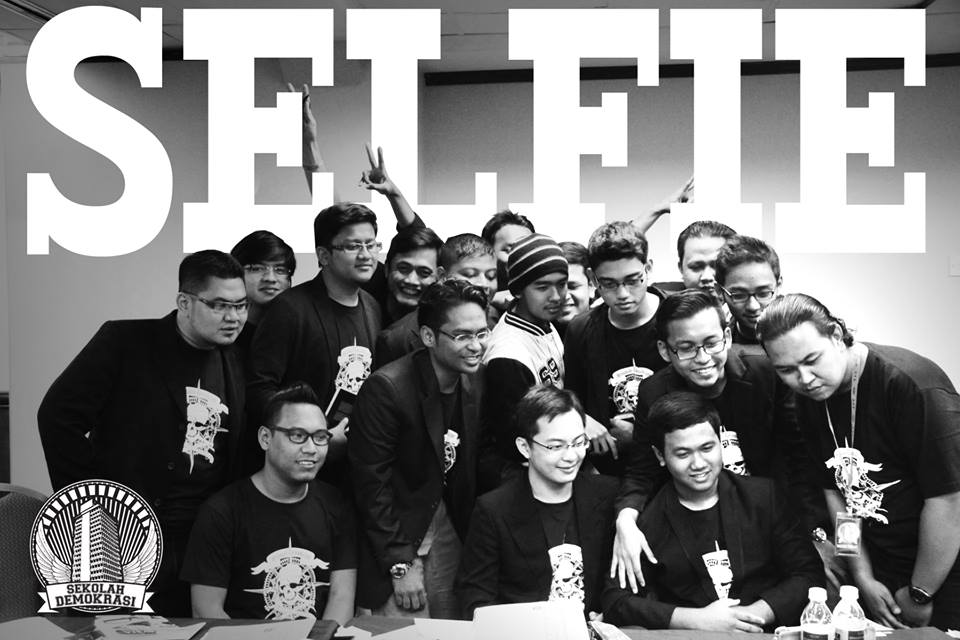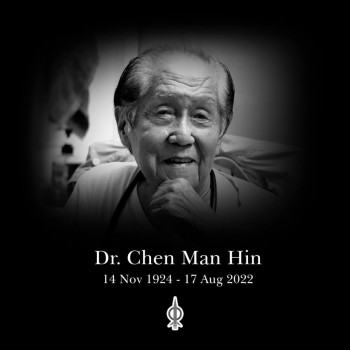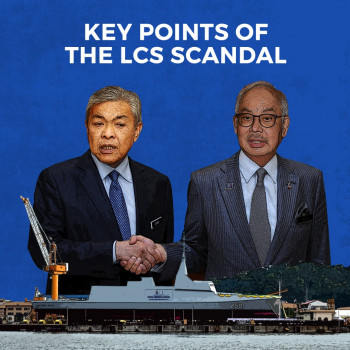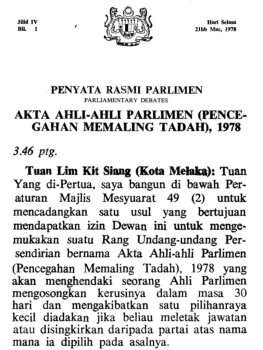Sekolah Demokrasi, or its literal translation ‘Democratic School’ is a political empowerment camp for youths interested in politics and social democracy in Malaysia. Cybertroopers have zoomed in on the Malay participants of this DAP training camp, calling them names like “betrayers of their race”, accusing them of forgetting their roots, and even vilifying them as “dogs who have fed on DAPigs”. Just what is Sekolah Demokrasi and why is this training camp organised by DAP so hated? Ralvin Manikam speaks to its organisers and participants to find out.
Inevitably, during each session of Sekolah Demokrasi, Edry Faisal would have to play peacemaker or sometimes counsellor to the participants. Many of them face pressure and questioning from family and friends for having participated in the political education program.
At times, their reputations are attacked online by quarters claiming that the participants -mostly Malay youth- have been “misused” by DAP.
“Some of the participants told me that their parents called them up, asking them what the fuss was all about. They wanted to make sure that their children weren’t becoming communists!
“There was also this case where a parent of this Chinese guy called him up to ask him if he became a Muslim,” he laughed while recalling the incident.
Together with a team of facilitators, Edry helps to coordinate and run the two-day camps which started out as an “underground” activity. Since 2012, DAP’s Malay language web portal Roketkini has organised the camps as a platform to expose youths to politics, social democracy, and DAP’s ideology.
The camps are deliberately small scale – not more than 40 participants per session – and provide a safe space for participants to thrash out political ideology, philosophical concepts, and also to ask all the questions they want about a party that has been accused in the same breath of being “chauvinist”, “communist”, and “Christian”.
Participants sit through lectures, conduct mock debates, and go through group activities designed to stimulate discussion. The camp attracts youths from diverse backgrounds, mostly tertiary students, those who are interested in politics, are curious about DAP, or are just looking to explore.
When it was initially conceptualised, Sekolah Demokrasi was a “hush hush” project and participants for the closed door event were sourced by recommendation only, through known and trusted contacts. The organisers were painfully aware of “interference” or monitoring from the Special Branch, hence they took pains to vet the participants.
Over the years, the camp has gained popularity through word of mouth and over 15 batches of students have “graduated” from the program. It has been organised in Kuala Lumpur, Johor, Penang, and other towns.
The camp has three levels or “tingkatan”, with Tingkatan Satu being the most elementary and basic level that newbies start with. Tingkatan Dua is more advanced and in depth in terms of syllabus, participants must have gone through the first level in order to qualify for the second one.
So far, they have not organised Tingkatan Tiga yet, the planning is still in the works once enough participants qualify.
By popular demand, the organisers opened up the registration this year for registration by members of the public, due to the increase in interest. The organisers hope to partner with local student leaders to plan camps in more venues, in not only urban but rural areas.
Why Sek Dem?
Edry tells us that Sek Dem was formulated with the intention to introduce the party to those who are curious about it, particularly Malays who have been taught to fear the party. He believes that of the three parties in the Pakatan Rakyat coalition, DAP is the least known amongst the Malays, due to the media censorship that shelters them from political education.
For many who joined the camp, it was the first time that they had an opportunity to meet members of DAP. They are often surprised to find that there are many Malays in the party generally perceived to mostly traditionally “Chinese” in terms of membership.
In fact, Sek Dem alumni have always been majority Malay in terms of racial composition. What the organizers find amusing is that most of the Malay participants feel disappointed by the poor showing of non-Malays at these camps, Edry reveals.
Language is not a barrier for people from all races to join the program, while Malay is the main language used in the activities, English too is widely used. Facilitators and participants do not have a problem communicating with each other.
The types of participants vary from place to place where the Sek Dem is organized; the one in Kuala Lumpur attracts mostly students while the Penang Sek Dem has a number of youth who are SPM leavers.
One of the challenges faced by the organizers is to handle a more pragmatic group that is more concerned about local issues. Edry finds it crucial to link ideology with real life issues.
“We have to find a way for those who are not interested in ideology to understand how social democracy would affect the lay man on the street,” he said.
UMNO feels “threatened” by us
When asked how Sek Dem gauges its success, Edry said that there are “two kinds of successes” that could be seen from the camps.
“Firstly, we were able to scare our enemy.”
UMNO Youth Chief Khairy Jamaluddin had said in a forum that DAP had at least 25 Malay youth who attend their camps, and that UMNO leaders are worried of that trend. This ‘problem’ was further perpetuated by Dyana Sofya’s election campaign in Teluk Intan that shed light on DAP’s openness towards youths with calibre regardless of race.
Edry believes that UMNO’s way of responding to SEK DEM is the launching of its own academy Akademi Kepimpinan Kapten Hussein (AKHI) – to mold young minds into leaders through political education and public engagement in the Barisan Nasional alliance.
It should be noted that BN had less than four percent of its candidates who are below forty years of age in the last general elections. Whereas Pakatan Rakyat has been fielding a large number of young candidates regardless of race. This trend has capture the attention of the youth who are becoming more politically savvy and are influenced by social movements around the world.
Secondly, Edry adds, Sekolah Demokrasi was able to clear the air about the concept of secularism that the party upholds. He said Malays are used to the tarnished image of secularism due to unscrupulous propaganda from the other side targeted at the Malay community. Those indoctrinated with the idea that secularism is anti-Islam or anti-Malay would be surprised to find that this is untrue.
“What DAP fights for is for a truly secular nation where religion and government is separate, therefore allowing freedom of religion without its interference into governing issues,” Edry said.
As a party member and staunch Muslim himself, he has no problems relating to DAP’s secular stand and does not see it as stifling religion. He sees DAP as an ideal party for all Malaysians regardless of faith.
Edry adds that DAP’s secular stand is supported by the fact that the Malaysian constitution is a secular document. The party has always embraced fully the concept of constitutional Monarchy whereby the monarch is the head of Islam, the country’s official religion.
Sek Dem graduates have their say
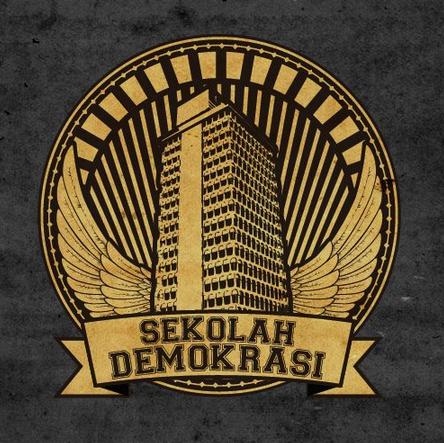 Luqman Tarmizi, a law student who was one of the participants of the SEK DEM found it interesting that some of the speakers were open enough to criticize Pakatan Rakyat for some of its failings.
Luqman Tarmizi, a law student who was one of the participants of the SEK DEM found it interesting that some of the speakers were open enough to criticize Pakatan Rakyat for some of its failings.
“I found it unusual but refreshing that each speakers had different messages to convey; some even directly opposed to another speakers’ message,” said Luqman.
For instance, one speaker had criticized the current Reformasi movement as being Anwar-centric, while another had defended the Pakatan leader and the Kajang move as being the right decision in a very grey political landscape.
He also enjoyed the question and answer session where participants can rebut or ask questions about the topic being discussed.
Luqman said that the reason he attended the camp was because he was curious and wanted to learn more about politics and democracy. However, being an advanced scholar of history himself, he found Sek Dem Tingkatan 1 to be very elementary for him.
“But I found that the talks on the philosophy of Social Democracy to be very enlightening,” he added.
He is hoping to join Sek Dem Tingkatan 2 with the hope that it is more challenging than the camp that he had attended. He also wishes that the Sek Dem alumni organize activities for its ‘graduates’ to be more than just passive participants who listen to lectures.
When trying to understanding the motivation behind the decision of participants to attend the camp, one student said that he was interested in politics and the fight for freedom and liberty in Malaysia.
Yu Sheng Leong, a student activist from University Malaya said that he first became interested in these elements after he completed secondary school.
“Before SPM, everything is fair, everyone feels like they are treated equally as Malaysians – but you begin to realize discrimination as soon as SPM is over,” he said.
Leong feels that it is unfair that non-Malay students do not have the same chances as Malays do to enter Matriculation and instead many have to go through STPM which is generally believed to be one of the hardest examinations in the world.
Despite the two examinations being of differing standards, the STPM grads compete with Matriculation students for limited places in much sought-after local universities. It is perceived to be easier for Matriculation students to obtain a high Cumulative Grade Point Average (CGPA) due to the internal marking system.
He felt outraged when he witnessed his non-Malay friends being unable to obtain entry into Matriculation courses despite obtaining the same results as their Malay friends.
Leong said that this was the first rage inducing moment that opened his mind about the inequalities in Malaysia. Being an activist himself, his curiosity about politics led him to join Sek Dem which he found out about through his contacts.
“It matters who organized Sek Dem. If it was MCA, MIC or UMNO, of course I would not join it,” he said.
He said that he was pleased that it was not a “DAP brainwashing camp”, saying that the differences in opinions amongst the speakers themselves was very much welcomed by listeners there.
Leong said that it is important that social democracy is taught in the camp, and wishes that school textbooks also explored the concept.
He said that he understood that social democracy is important in the Malaysian context to balance capitalism with a welfare state, one that serves the rakyat and not the cronies.
Leong and Luqman both hope that the SEK DEM sessions continue, because they believe in the education of the public on the concept of social democracy, and that it would benefit the rakyat as a whole to support its implementation in Malaysian policies.
Those interested in attending Sekolah Demokrasi can log on to their Facebook page at https://www.facebook.com/sekolahdemokrasi. The camp is free and open to all.

